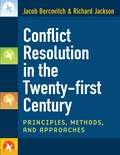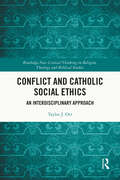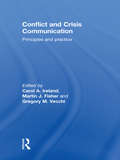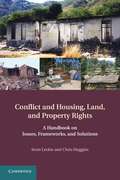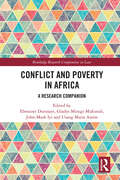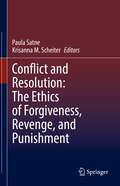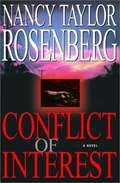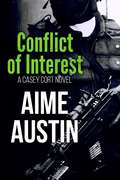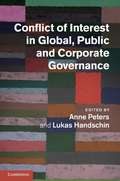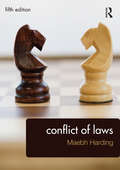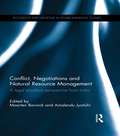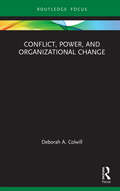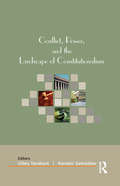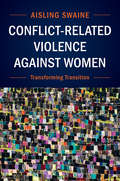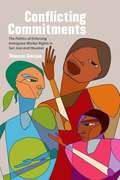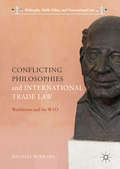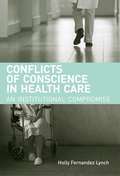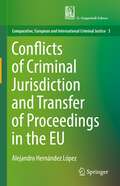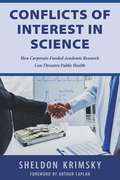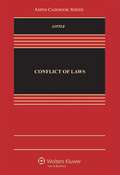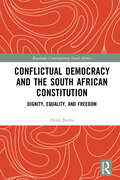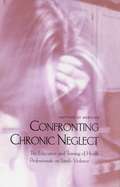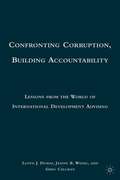- Table View
- List View
Conflict Resolution in the Twenty-first Century: Principles, Methods, and Approaches
by Jacob Bercovitch Richard Jackson"An outstanding overview and assessment of contemporary conflict resolution; the authors never avoid the challenging questions, or critical answers. " ---Åshild Kolås, Program Leader, Conflict Resolution and Peacebuilding Program, International Peace Research Institute, Oslo (PRIO) "Conflict Resolution in the Twenty-first Centuryis very readable and crystallizes the breadth of conflict resolution today and the relevance of new approaches for the future. " ---Jeffrey W. Helsing, Deputy Director, Education and Training Center, United States Institute of Peace "This concise and readable volume offers readers an impressive sample of the responses---both traditional and emerging---in the conflict resolution toolbox, crisply outlining how they relate to today's dynamic conflict environment. " ---Chester A. Crocker, James R. Schlesinger Professor of Strategic Studies, Edmund A. Walsh School of Foreign Service, Georgetown University "Authoritative, well written, and astoundingly broad and deep. Must-reading for all students of international and ethnopolitical conflict resolution. " ---Dean G. Pruitt, Distinguished Scholar in Residence, Institute for Conflict Analysis and Resolution, George Mason University "The idea that the nature and methods of conflict resolution ought to change as the kinds of conflict that dominate the world-at-large shift is very appealing. " ---Professor Lawrence Susskind, Director, MIT-Harvard Public Disputes Program "A comprehensive overview, based upon in depth familiarity with the research, scholarship, and practice in the field. " ---Louis Kriesberg, Professor Emeritus of Sociology and Maxwell Professor Emeritus of Social Conflict Studies, Syracuse University In the past, arbitration, direct bargaining, the use of intermediaries, and deference to international institutions were relatively successful tools for managing interstate conflict. In the face of terrorism, intrastate wars, and the multitude of other threats in the post-Cold War era, however, the conflict resolution tool kit must include preventive diplomacy, humanitarian intervention, regional task-sharing, and truth commissions. Here, Jacob Bercovitch and Richard Jackson, two internationally recognized experts, systematically examine each one of these conflict resolution tools and describe how it works and in what conflict situations it is most likely to be effective. Conflict Resolution in the Twenty-first Centuryis not only an essential introduction for students and scholars, it is a must-have guide for the men and women entrusted with creating stability and security in our changing world. Jacob Bercovitch is Professor of International Relations at the University of Canterbury, New Zealand. Richard Jackson is Reader in International Politics at Aberystwyth University, United Kingdom. Cover illustration © iStockphoto. com
Conflict and Catholic Social Ethics: An Interdisciplinary Approach (Routledge New Critical Thinking in Religion, Theology and Biblical Studies)
by Taylor J. OttThis book focuses on the question of how to understand conflict and its place in Catholic and Christian social ethics. The author examines Catholic social teaching (CST) for its explicit mentions of conflict or contention and analyzes the way that CST addresses the subjects of peace, labor, and environment. While CST offers precedent to think about conflict within the frame of Catholic ethics, its lack of explicit engagement remains a major obstacle to a full, rich, and concrete understanding of the fabric of society and the work of social justice. Any social ethic that is not informed by the presence of conflict misses a major dynamic in society, and therefore leads to ethical judgements that are at best inadequate, and at worst, actively harmful. Building upon the insight of respected thinkers within Catholic social thought, this study is based on an interdisciplinary method that engages sociology, political theory, postcolonial theory, and intersectional feminist ethics. The book will be of particular interest to theological ethicists and those who work with modern CST.
Conflict and Crisis Communication: Principles and Practice
by Carol A. Ireland Martin J. Fisher Gregory M. VecchiConflict and crisis communication is the management of a critical incident which has the potential for resolution through successful negotiations. This can include negotiating with individuals in crisis, such as those threatening self-harm or taking individuals hostage as part of emotional expression, and also critical incidents such as kidnapping and terrorist activities. By focusing on the empirical and strong theoretical underpinnings of critical incident management, and including clear demonstrations of the practical application of conflict and crisis communication by experts in the field, this book proves to be a practical, comprehensive and up-to-date resource. Discussion of relevant past incidents – such as the 1993 WACO siege in the United States – is used to enhance learning, whilst an examination of the application of critical incident management to individuals with mental disorder offers groundbreaking insight from clinicians working in this area. Conflict and Crisis Communication is an excellent source of reference for national and international law enforcement agencies, professionals working in forensic settings, and also postgraduate students with an interest in forensic psychology and forensic mental health.
Conflict and Housing, Land and Property Rights
by Scott Leckie Chris HugginsHousing, land and property (HLP) rights, as rights, are widely recognized throughout international human rights and humanitarian law and provide a clear and consistent legal normative framework for developing better approaches to the HLP challenges faced by the UN and others seeking to build long-term peace. This book analyses the ubiquitous HLP challenges present in all conflict and post-conflict settings. It will bridge the worlds of the practitioner and the theorist by combining an overview of the international legal and policy frameworks on HLP rights with dozens of detailed case studies demonstrating country experiences from around the world. The book will be of particular interest to professors and students of international relations, law, human rights, and peace and conflict studies but will have a wider readership among practitioners working for international institutions such as the United Nations and the World Bank, non-governmental organizations, and national agencies in the developing world.
Conflict and Poverty in Africa: A Research Companion (Routledge Research Companions in Law)
by John-Mark Iyi Ebenezer Durojaye Gladys Mirugi-Mukundi Usang Maria AssimThe contributors to this book examine the conceptual issues relating to the link between conflict and poverty as well as presenting case studies of countries often regarded as ‘hot spots’ for conflict in Africa. They also explore the roles of regional and sub-regional bodies and institutions in addressing the causes of poverty and mitigating the impacts of conflict on vulnerable and marginalized groups.Africa is often regarded as the epicentre of conflicts worldwide. Virtually every part of the continent is currently engulfed in one form of conflict or another. Beyond the loss of life, conflicts have brought untold hardship to millions and have derailed social and economic development on the continent. Written by African academics, this book is divided into three sections, the first of which discusses the factors that fuel conflicts and the nature and impacts of conflicts on vulnerable groups. The second section comprises case studies of South Sudan, Central African Republic, Nigeria, Ethiopia, South Africa, Uganda, and Cameroon. These countries are representative of the sub-regional dynamics of Africa – west, east, central, and south – reflecting the diversity of the continent. The final section examines the role of key institutions and bodies in Africa in mitigating the impact of conflict on the socioeconomic lives of the people in the region. Bodies discussed include the African Union, Economic Community of West African States, Southern African Development Community, and the East African Community.The book will be an invaluable resource for researchers, academics and policymakers working in the areas of law, political science, human rights, peace studies, development studies, and African studies.
Conflict and Resolution: The Ethics of Forgiveness, Revenge, and Punishment
by Paula Satne Krisanna M. ScheiterGiven the current climate of political division and global conflict it is not surprising that there has been an increasing interest in how we ought to respond to perceived wrongdoing, both personal and political. In this volume, top scholars from around the world contribute all new original essays on the ethics of forgiveness, revenge, and punishment. This book draws on both historical and contemporary debates in order to answer important questions about the nature of forgiveness, the power of apology, the relationship between punishment and revenge, the path to reconciliation, the morality of blame, and the role of forgiveness in political conflict.Chapter 16 is available open access under a Creative Commons Attribution 4.0 International License via link.springer.com.
Conflict of Interest
by Nancy Taylor RosenbergThis is a story where a number of people, including a LD man, get twisted in a complex plot of crime and violence.
Conflict of Interest (A Casey Cort Novel #5)
by Aime AustinSylvie Fox writing as Aime Austin presents this Casey Cort legal thriller. Troy Duncan has just two worries on his mind: how he is going to give his two young children and fiancé a Christmas they deserve and whether his job at a struggling restaurant will last through the winter. As he leaves work early on another slow night, he runs into something that changes his life forever. Cleveland Police Officer Marc Baldwin has been on the job for more than two decades, risking his life every day to keep the city streets safe for others. One cold night in December, he gets a routine call to break up drug activity in the newly popular Flats district, but what happens there is anything but routine, as circumstances prompt Marc to draw—and use—his service weapon. Attorney Casey Cort is finally changing her life for the better. After an uplifting year of pro bono adoption work under her belt, she is hoping to start a practice free of the emotional turmoil and problems of criminal defense and divorce. Easier said than done, particularly when a new, high-profile referral comes from a most unlikely source. Once again, Casey finds herself in the middle of a major controversy—and a city on the verge of riot. In this fourth installment of the Casey Cort series, Aime Austin—a former trial lawyer in Cleveland—weaves another tale that blends the best of today’s top legal thrillers with the heart and soul of women’s fiction, in a story ripped from real-world headlines.
Conflict of Interest in Global, Public and Corporate Governance
by Anne Peters Lukas HandschinConflict of interest occurs at all levels of governance, ranging from local to global, both in the public and the corporate and financial spheres. There is increasing awareness that conflicts of interest may distort decision-making processes and generate inappropriate outcomes, thereby undermining the functioning of public institutions and markets. However, the current worldwide trend towards regulation, which seeks to forestall, prevent and manage conflicts of interest, has its price. Drawbacks may include the stifling of decision-making processes, the loss of expertise among decision-makers and a vicious circle of distrust. This interdisciplinary and international book addresses specific situations of conflict of interest in different spheres of governance, particularly in global, public and corporate governance.
Conflict of Laws
by Maebh HardingConflict of Laws provides a straight-forward and accessible introduction to English private international law. It examines the jurisdiction of English courts (and whether their judgments are enforced and recognized overseas) and the effect of foreign judgments in England. Recent years have seen an increased ‘Europeanization’ of English Law which has transformed the subject and this fifth edition takes into account key recent developments and regulations including proposed changes to Brussels I, Rome II, The Maintenance Regulation, Rome III, the proposed Rome IV and the proposed Succession Regulation. ? Harding provides students with a clear understanding using pedagogic methods such as; Key Issues checklists at the start of every chapter to help track important points for further study Figures are used to aid understanding through visual learning Further Reading is included at the end of every chapter to enourage and support additional study ? Further developments addressed in the fifth edition include:• The use of common law doctrines in EU cases such as West Tankers. • The EU imperative for family relationships to be recognized across the EU in the context of citizen’s rights. • Civil Partnerships and recognition of same sex partnership. • Rome III, Rome IV and the distinction between maintenance and matrimonial property.• Adoption, Parental Responsibility and International Child Abduction • Surrogacy and Assisted Reproduction ? Conflict of Laws is an ideal choice for undergraduate and postgraduate students seeking a comprehensive yet accessible introduction to private international law.
Conflict, Negotiations and Natural Resource Management: A legal pluralism perspective from India (Routledge Explorations in Environmental Studies)
by Maarten Bavinck Amalendu JyotishiConflicts over natural resources abound in India, where much of the population is dependent on these resources for their livelihoods. Issues of governance and management are complicated by the competing claims of parallel legal systems, including state, customary, religious, project and local laws. Whereas much has been written about property rights, this unique collection takes a legal anthropological perspective to explore how the coexistence and interaction between multiple legal orders provide bases for claiming property rights. It examines how hybrid legal institutions have developed over time in India and how these impact on justice in the governance and distribution of natural resources. The book brings together original case studies that offer fresh perspectives on the governance of forests, water, fisheries and agricultural land in a diverse range of social and spatial contexts. This brand new research provides a timely and persuasive overview of the fundamental role of parallel legal systems in shaping how people manage natural resources. It will be of interest to scholars and practitioners of environmental law, property law, environmental politics, anthropology, sociology and geography.
Conflict, Power, and Organizational Change (ISSN)
by Deborah A. ColwillA capacity for learning, adapting, and changing is an important facet of organizational resilience. What is involved in generative organizational change? Is it an event, a process, or constantly ongoing? What makes organizational change "good" for the organization? Who has the power to decide what is "good" for the organization and its members? How is it decided? What if there is strong disagreement or conflict? How is that handled? What is the role of organizational members and leaders in these discussions? As these questions demonstrate, the triad of change, power and conflict are intimately linked. The purpose of this book is to explore the topics of change, power and conflict as they relate to the experiences of everyday organizational life. It will provide readers the opportunity to reflect critically on their own local experience and involvement in organizations and to glean actionable wisdom for meaningful engagement and impactful contributions to their organization(s) in the present and future.Conflict, Power, and Organizational Change will be of interest to students, researchers, academics and professional colleagues interested in the fields of business and organizational studies, especially those wanting to get acquainted with the concepts of change, power and conflict in contemporary organizational settings.
Conflict, Power, and Organizational Change (Routledge Focus on Business and Management)
by Deborah A. ColwillA capacity for learning, adapting, and changing is an important facet of organizational resilience. What is involved in generative organizational change? Is it an event, a process, or constantly ongoing? What makes organizational change "good" for the organization? Who has the power to decide what is "good" for the organization and its members? How is it decided? What if there is strong disagreement or conflict? How is that handled? What is the role of organizational members and leaders in these discussions? As these questions demonstrate, the triad of change, power and conflict are intimately linked. The purpose of this book is to explore the topics of change, power and conflict as they relate to the experiences of everyday organizational life. It will provide readers the opportunity to reflect critically on their own local experience and involvement in organizations and to glean actionable wisdom for meaningful engagement and impactful contributions to their organization(s) in the present and future. Conflict, Power, and Organizational Change will be of interest to students, researchers, academics and professional colleagues interested in the fields of business and organizational studies, especially those wanting to get acquainted with the concepts of change, power and conflict in contemporary organizational settings.
Conflict, Power, and the Landscape of Constitutionalism
by Gilles TaraboutThe book seeks to critically examine the implication of a constitution of law for a political society. It presents a collection of essays that seek to investigate how power acts on power, how limits produce excess, how separation of powers produces the union of powers (sanctified by the very constitution that had guaranteed the division in the first place), and how the theory of separation is, at the same time, a myth and a reality. At the backdrop of the book, of course, is the theory that every good constitution rigorously separates the legislature, the executive, and the judiciary from one another to guarantee the independence of each of these powers, such that this separation results in life, liberty, and security. If a constitution, however, symbolises and produces power, precisely because it separates one site of power from another, it follows that it is power itself that is the limit of power. Constitutionalism as a political culture of laws, therefore, must explain the dynamics of power.The book addresses both constitutions and the societies in which they emerge. Many of the essays in this collection show how institutional practices originating from a legal text create a matrix of power that owes its life, neither to a contract between men, nor between the state and men, nor even between the society and men, but rather to relations established, organized, and formalized by laws. The collection is significant because it gives colonial and post-colonial experiences a justified place in studies of law and constitutionalism, for it shows that while Montesquieu, Kant, and Burke each in their own way were promoting the spirit of laws, a more significant history of law-making was being enacted in order to defend a particular rule, and a particular type of government on another side of the world. Based on comparative studies in several countries across three continents, the book centrally deals with issues of constitutionalism, politica
Conflict-Related Violence Against Women: Transforming Transition
by Aisling SwaineBy comparatively assessing three conflict-affected jurisdictions (Liberia, Northern Ireland and Timor-Leste), Conflict-Related Violence against Women empirically and theoretically expands current understanding of the form and nature of conflict-time harms impacting women. The 'violences' that occur in conflict beyond strategic rape are first identified. Employing both a disaggregated and an aggregated approach, relations between forms of violence within and across each context's pre-, mid- and post-conflict phase are then assessed, identifying connections and distinctions in violence. Swaine highlights a wider spectrum of conflict-related violence against women than is currently acknowledged. She identifies a range of forces that simultaneously push open and close down spaces for addressing violence against women through post-conflict transitional justice. The book proposes that in the aftermath of conflict, a transformation rather than a transition is required if justice is to play a role in preventing gendered violence before conflict and its appearance during and after conflict.
Conflicting Commitments
by Shannon GleesonIn Conflicting Commitments, Shannon Gleeson goes beyond the debate over federal immigration policy to examine the complicated terrain of immigrant worker rights. Federal law requires that basic labor standards apply to all workers, yet this principle clashes with increasingly restrictive immigration laws and creates a confusing bureaucratic terrain for local policymakers and labor advocates. Gleeson examines this issue in two of the largest immigrant gateways in the country: San Jose, California, and Houston, Texas. Conflicting Commitments reveals two cities with very different approaches to addressing the exploitation of immigrant workers-both involving the strategic coordination of a range of bureaucratic brokers, but in strikingly different ways. Drawing on the real life accounts of ordinary workers, federal, state, and local government officials, community organizers, and consular staff, Gleeson argues that local political contexts matter for protecting undocumented workers in particular. Providing a rich description of the bureaucratic minefields of labor law, and the explosive politics of immigrant rights, Gleeson shows how the lessons learned from San Jose and Houston can inform models for upholding labor and human rights in the United States.
Conflicting Philosophies and International Trade Law: Worldviews and the WTO (Philosophy, Public Policy, and Transnational Law)
by Michael BurkardThis book reveals how conflicting worldviews are at the root of public controversies on policy and trade issues. It highlights the particularly controversial disputes at the level of the World Trade Organization in the case of regulating beef-hormones and GMOs, aiming to show how negotiators of international agreements, members of dispute settlement bodies, and policy makers in general could have recourse to concepts of other disciplines such as epistemology and philosophy in order to address deadlocked legal disputes. Ultimately, the book is a manifesto for independent and critical research.
Conflicts in the Knowledge Society
by Sebastian HaunssIn Conflicts in the Knowledge Society, Sebastian Haunss demonstrates how conflicts relating to the international system of intellectual property have resulted in new cleavages in the knowledge society. Furthermore, he argues that new collective actors have emerged from these conflicts with the ability to contest the existing dominant order. With a focus on political opportunity structures, collective action networks and framing strategies, he combines a theoretical discussion of social change in the knowledge society with empirical analyses of four recent developments: software patents in Europe, access to medicines, Creative Commons licensing and Pirate Parties.
Conflicts of Conscience in Health Care: An Institutional Compromise
by Holly Fernandez LynchIn Conflicts of Conscience in Health Care, Holly Fernandez Lynch finds a way around the polarizing rhetoric associated with this issue by proposing a compromise that protects both a patient access to care and a physician's ability to refuse.
Conflicts of Criminal Jurisdiction and Transfer of Proceedings in the EU (Comparative, European and International Criminal Justice #3)
by Alejandro Hernández LópezFramework Decision 2009/948/JHA on the prevention and settlement of conflicts of exercise of jurisdiction in criminal proceedings established an ad hoc procedure for settling conflicts of criminal jurisdiction based on the mutual exchange of information and the establishment of direct consultations between the competent authorities with a view to reaching consensus on an effective solution. However, neither common legally binding criteria for deciding the best jurisdiction nor specific rules for the transfer of proceedings (which can occur after parallel proceedings have been identified) were established in this instrument, or in any other instrument adopted by the EU to date. This book analyses the current EU legal framework on conflicts of jurisdiction and transfer of criminal proceedings, paying special attention to its numerous shortcomings and loopholes from a fundamental rights and due process of law perspective. The book begins with an assessment of the various principles and grounds used by Member States for claiming criminal jurisdiction. Secondly, de lege lata EU procedure on the settlement of conflicts of criminal jurisdiction, as well as its implementation in Spain and Italy, are thoroughly examined. After discussing the main principles and fundamental rights at stake, the author proposes two alternative and original de lege ferenda models for the prevention and settlement of conflicts of criminal jurisdiction and transfer of criminal proceedings, exploring the different possibilities offered by the EU’s primary law.
Conflicts of Interest In Science: How Corporate-Funded Academic Research Can Threaten Public Health
by Sheldon Krimsky30+ Years of Peer-Reviewed Studies on the Corporate Ties and Vested Interests that Influence Scientific ResearchFor over 500 years, groups and organizations with political, economic, and personal interests have successfully exercised influence on the pursuit of scientific inquiry and knowledge. History is replete with examples like the Papal authority muddying research into studies of the cosmos, but far less attention is paid today to the various corporate and special interest groups who, through funding and lobbying efforts, have been able to shape the modern academic and scientific landscape to fit their agenda.In Conflicts of Interest Within Science, author Sheldon Krimsky compiles 21 peer-reviewed, academic articles that examine the complex relationship between the individual scientists conducting research and the groups who fund them. Ultimately, Krimsky’s call to action concerns a collective movement among authors, peer reviewers, corporations and journal editors to disclose the sources of their funding. By holding scientists and the groups that fund them more accountable through increased transparency, we as a society can begin to rebuild trust in the integrity of knowledge.
Conflicts of Law: Cases, Materials, and Problems (Aspen Casebook Series)
by Laura E. LittleAward-winning teacher Laura Little offers a progressive, innovative approach to teaching complex material in the new casebook, Conflict of Laws. In a subject where there are few "right" answers and plenty of room for debate, this casebook offers a contemporary alternative to the subject by connecting coverage of key issues and concepts to law practice using modern cases-and-problem pedagogy. Features: Award-winning teacher and respected author Laura Little brings her considerable expertise in federal courts, conflict of laws, and constitutional law to the subject. Well-balanced casebook presents the deep jurisprudential lessons imbedded in the conflict of laws subject matter. Proven cases-and-problems pedagogy helps students apply concepts. Maintains a clear presentation of doctrines relevant to current law practice. Thematic approach puts conflicts of law in the context of actual issues confronted in law practice. Clear, straightforward writing avoids the "hide the ball" approach of many other books and maximizes accessibility to difficult material. Innovative organization, beginning with personal jurisdiction, follows the way issues arise in litigation and highlights the importance of forum selection. Highly adaptable modular presentation allows professors to customize approach. Contemporary cases and hypotheticals allow students to apply rules to current situations, while hallmark cases maintain continuity with the development of the discipline. Full coverage of current topics such as Internet issues, same-sex marriage, choice of law clauses, and class actions. International and comparative materials cover global aspects of conflicts. Emphasis on the Restatement (Second) of Conflicts, now the predominant United States approach but insufficiently covered in most other texts. Online PowerPoint slides, charts, and diagrams support teachability. Comprehensive Teachers Manual includes answers to every problem, teaching suggestions, sample syllabi, and a graphical depiction of each main case, as well as unique insights and case backgrounds.
Conflictual Democracy and the South African Constitution: Dignity, Equality, and Freedom (Routledge Contemporary South Africa)
by Henk BothaHuman dignity, equality, and freedom are central to the South African Constitution. This book examines these values through a conflictual democratic lens, which views conflict, power, and disagreement as constitutive of democracy.The book explores the capacity of value-based constitutional interpretation to create openings for democratic dialogue and emancipatory social struggles. Conversely, it also assesses the ability of constitutional interpretation to normalise and depoliticise domination, inequality, and exclusion. The book uses a conflictual frame to shed light on the interplay between the universality of dignity, equality, and freedom and the particularity of the discourses and conventions that mediate their interpretation and enforcement. It argues that such a frame could enable realistic assessments of the ability of the constitutional order to safeguard spaces for emancipatory struggles and respond to radical demands for the reconstitution of society.Drawing on the text of the Constitution, case law, academic commentary, and constitutional, political, and critical legal theory, this book will be an important read for researchers of constitutional law and critical legal theory, both within South Africa and beyond.Henk Botha is a Professor in the Faculty of Law, Stellenbosch University, South Africa.
Confronting Chronic Neglect: The Education and Training of Health Professionals on Family Violence
by Committee on the Training Needs of Health Professionals to Respond to Family ViolenceAs many as 20 to 25 percent of American adults or one in every four people have been victimized by, witnesses of, or perpetrators of family violence in their lifetimes.. Family violence affects more people than cancer, yet it's an issue that receives far less attention. Surprisingly, many assume that health professionals are deliberately turning a blind eye to this traumatic social problem.The fact is, very little is being done to educate health professionals about family violence. Health professionals are often the first to encounter victims of abuse and neglect, and therefore they play a critical role in ensuring that victims as well as perpetrators get the help they need. Yet, despite their critical role, studies continue to describe a lack of education for health professionals about how to identify and treat family violence. And those that have been trained often say that, despite their education, they feel ill-equipped or lack support from by their employers to deal with a family violence victim, sometimes resulting in a failure to screen for abuse during a clinical encounter.Equally problematic, the few curricula in existence often lack systematic and rigorous evaluation. This makes it difficult to say whether or not the existing curricula even works.Confronting Chronic Neglect offers recommendations, such as creating education and research centers, that would help raise awareness of the problem on all levels. In addition, it recommends ways to involve health care professionals in taking some responsibility for responding to this difficult and devastating issue.Perhaps even more importantly, Confronting Chronic Neglect encourages society as a whole to share responsibility. Health professionals alone cannot solve this complex problem. Responding to victims of family violence and ultimately preventing its occurrence is a societal responsibility
Confronting Corruption, Building Accountability
by Lloyd J. Dumas Janine R. WedelThe crisis that nearly brought the world's financial house down in 2008 demonstrated clearly that the global economy cannot work where there is widespread deception, corruption and lack of accountability. Corruption and lack of accountability are also key reasons why international development assistance so often fails to deliver on its promise.
